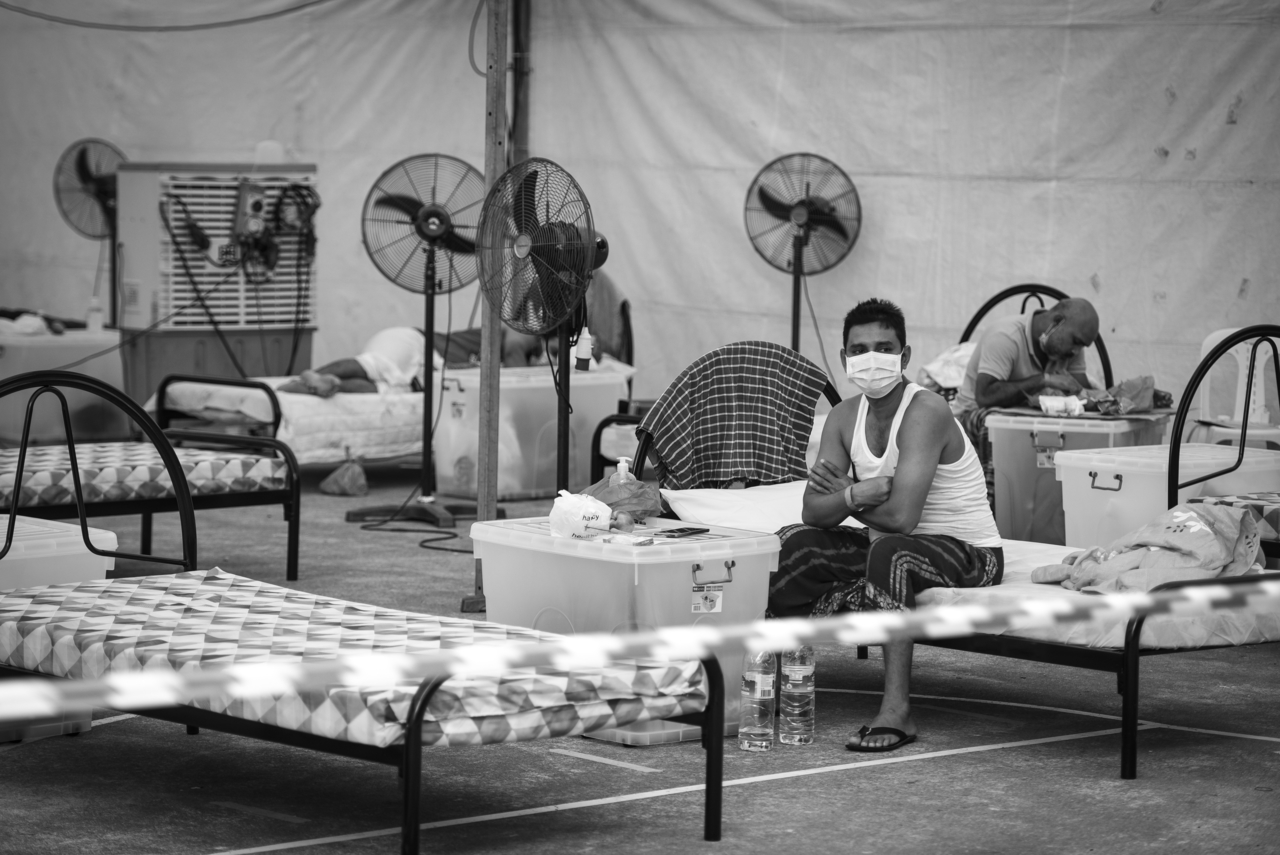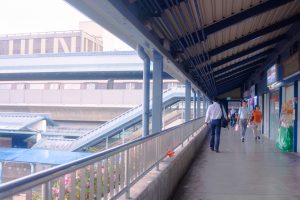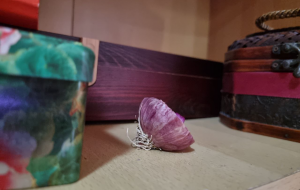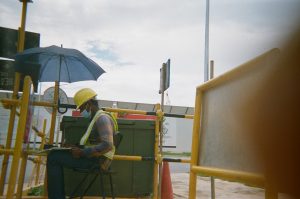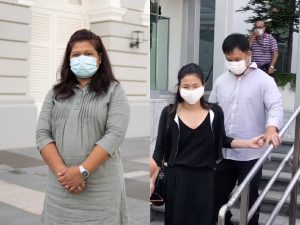Top image: Caroline Chia for CMSC. The dormitories depicted in these photos are not the dormitory featured in this piece.
In the last month, dormitory operators have been cast into the spotlight due to the massive spread of Covid-19 amongst the migrant worker community.
Some have been vilified for being greedy, exploitative, and neglectful. Other stories have emerged of operators sparing no effort to look after the men in their care.
We spoke to one dormitory operator, who would only give his name as Mr. Tan, who runs a factory-converted dormitory with about 500 residents. In mid-April, three residents were found to have Covid-19, and many more subsequently became infected.
While we recognise that this is only one individual’s perspective, and may not reflect the situation at other dormitories, or the views, experiences, and practices of other operators, we believe this account provides valuable insight into a situation which remains largely opaque to the public.
The following anecdotes are based on Mr Tan’s account of his experiences, as told to us. They have been condensed and compiled from a longer interview, with edits for length and clarity.
1. The dormitory
I run a factory-converted dormitory (FCD) housing about 500 men, mostly from Bangladesh and India. It was converted from an existing factory in an industrial estate in 2014, and was built solely to house our workers. I began working here in 2017.
All the residents work for the same employer in the construction industry. The company is a subsidiary of a larger holding company, which also owns the dormitory itself through another subsidiary.
My supervisor, David, is in charge overall. We’re both in our early 60s, and I help him oversee things and carry out any tasks that need to be done. It’s basically only the two of us. Services like catering, security, pest control, and cleaning are outsourced.
The dormitory is split over two floors (the 3rd and 4th floor of the factory) and has various sizes of bedrooms. The smallest houses about 10 men and the largest has 24.
This made safe distancing hard to carry out. We could put queue markers on the floor, but our bedrooms are fitted with bunk beds. Just based on this, there’s no way the men can stay at a distance.
In early March, Yinzhou [founder of Geylang Adventures and committee member of the Covid-19 Migrant Support Coalition (CMSC)] reached out to me. By this time, he was already in touch with several other operators to find out what their needs were, and wanted to know if I had back-up plans in case my workers got sick and needed to be isolated.
He asked, “If this [outbreak] happens [in your dormitory], are you also thinking to move your workers out to somewhere else?”
I didn’t think I would need to do that. We were hoping that our dorm would be okay, we had passed our inspections and I thought we were quite clean.
But then we got hit with the first few cases, and I don’t know how to explain it, but suddenly everything happened. We were trying our best, but we just couldn’t cope when it came for us.
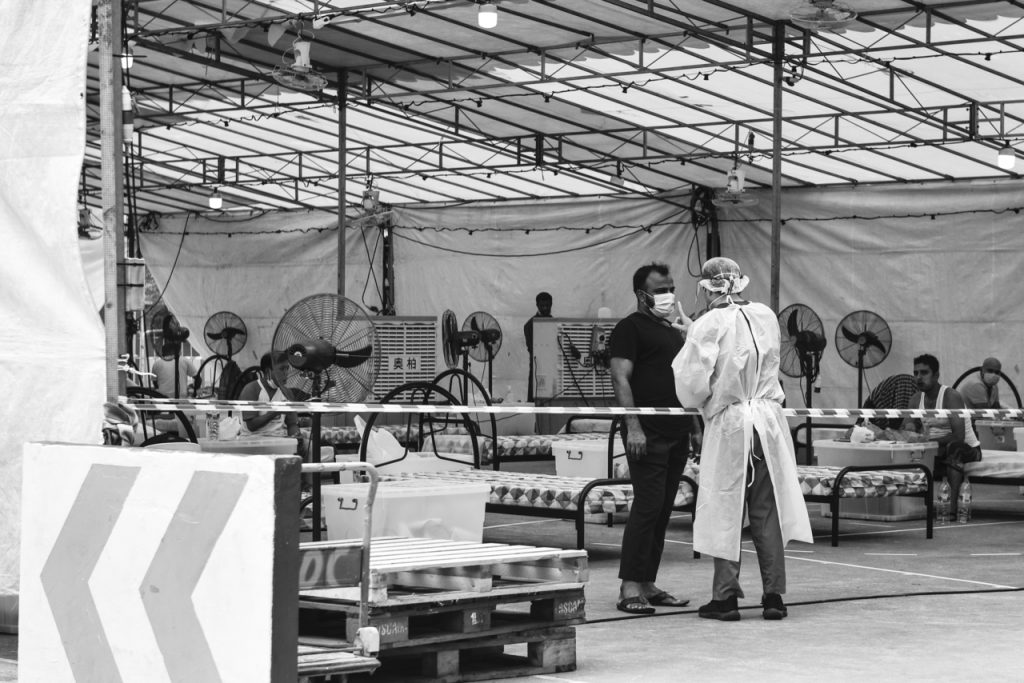
2. Covid-19 arrives
The start of the circuit breaker was stressful. Between April 8th to 10th, just after it began, I sent several emails to the authorities asking for more support for factory-converted dorms like mine during this period, as we lack the facilities and resources of the larger purpose-built dormitories (PBDs). I didn’t get a response to these until April 16th.
Things began getting bad on April 14th, when 3 of my men went to the clinic with symptoms. Three days later, on April 17th, the clinic called back to confirm they had tested positive for Covid-19.
At first, we thought that help would be immediate, and an ambulance would come to take them away the same day. I also sent another email to the authorities about the situation. But we waited and waited until quite late and nobody came.
I felt that this was wrong, so the next morning, April 18th, I called up MOH to ask for help. I was told that I might need to wait some time for the three men to be taken out.
I wasn’t sure how long this would take, and I couldn’t hold on. All the other residents were concerned about getting sick. They were already asking me, “Mr Tan, Mr Tan, when are they going? When are they going?’ I had to tell them that the ambulance was coming but it would take some time, and just to focus on staying healthy themselves.
Plus, as a FCD, our facilities just aren’t equipped for something like this. We have an isolation room, but this was only meant to cater for three or four people getting sick at one time. Thankfully, we have a big recreation room and an empty office space on the second floor, which we converted into another isolation room. But if more people got sick, what were we going to do?
I was getting desperate. A few days had already passed since the men developed symptoms. Seeing all the men sitting there, maybe getting infected, and the ambulance not coming … I really didn’t know what to do. I felt so scared and so sorry for them. On the one hand I wanted to go near them, on the other I shouldn’t. I had to get help from outside.
As the men were also getting increasingly worried, I called Yinzhou for help, and sent another follow-up email to the authorities. Late that night, I got a reply saying that the Inter-Agency Task Force had been notified, and that FAST (Forward Assurance and Support Team) and MOM were looking into it.
The next day, April 19th, a team arrived to help us. They began testing all the residents, which took two days, and evacuated the three confirmed cases.
This was when everything went wild. The testing had started on a Sunday. By Wednesday, when the full results came out, our confirmed cases had gone from 3 to 24, then 45 …87… As of today, there are over 100.
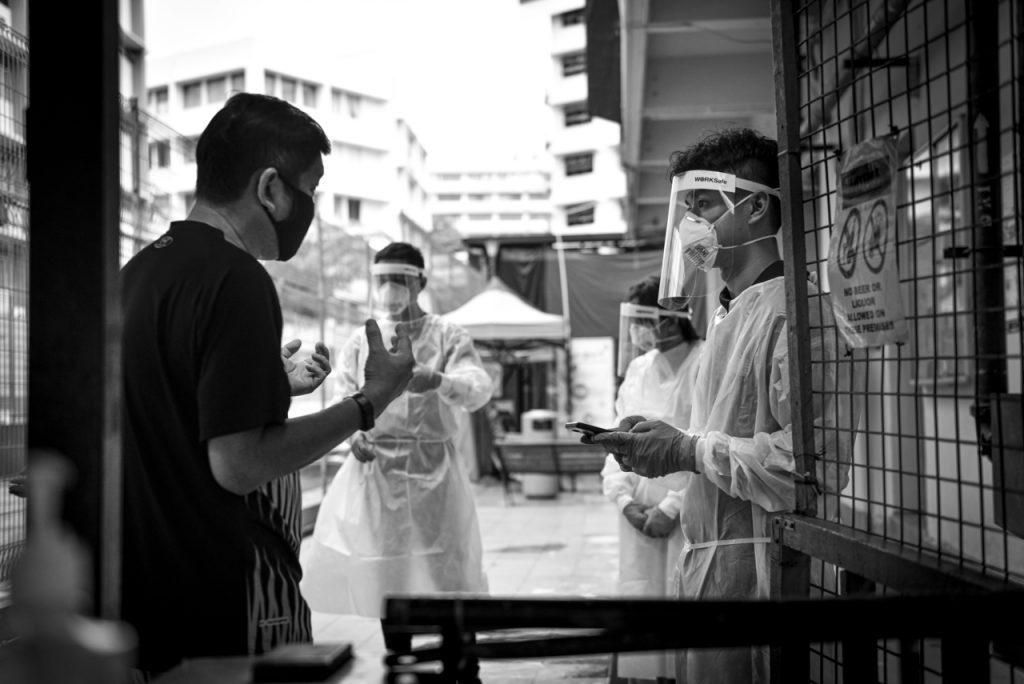
3. High and dry
When all this started happening, my security company wanted to quit.
I told them, you can’t do that. You can’t do that! But the security guards, both of whom had been working with me for many years, left anyway.
I wasn’t happy, but I tried to understand because they’re both much older than me. Their families wouldn’t want them working in the dormitories. But when they quit, I was left with nobody.
At first, their company sent a replacement. But a few days later, we got an email from them at 3:00 PM or 4:00 PM, saying that that night would be their last day of service. Due to Covid-19, they claimed they had to suspend their services.
By this time, the cases were climbing. I was too busy trying to take care of the men. I didn’t have time to deal with something like this.
Now the man from my pest control company has also quit. A few days ago, he sent me an email saying that he couldn’t come in now that the dormitory has cases.
By this time, David, my supervisor, was working seven days a week, clocking 10 or 12 hours a day. When the security company quit, he got his wife and son to come down and help.
I felt bad about asking so much of them because of the risks. But they willingly came that day, and the day after, taking it in shifts to come help out. His son even brought two friends in their 20s, just out of the army, to help with night guard duty.
His wife kept telling me, “Mr Tan don’t worry, don’t keep on saying thank you. We’re here to help each other. Got problem, we come here to help sort it out.” The CMSC and my bosses also gave them protective equipment like face shields and face masks, and my bosses bought Chinese herbs for them to take.
Because David was spending so much time with the residents, he was told to get swabbed and put on a five-day MC, which has since ended. I’m still going down when I can. But even then, David tries to ask me not to go down, insisting that he’ll call me if he needs anything. Still, I know he won’t do it unless it’s a really big problem, because it’s just the two of us. We can’t both get sick.
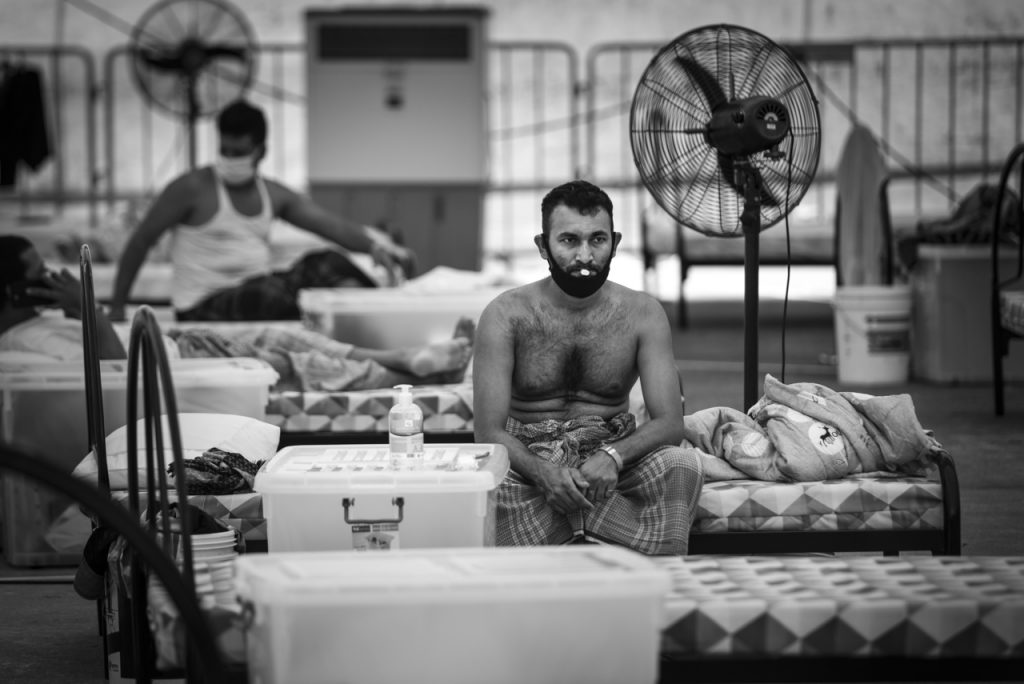
4. Current concerns
Right now, a lot of the men have been moved out, both confirmed cases and their roommates who have been quarantined. MOH emails the men’s employer, as well as David and I, to update us on where they are being housed and any new cases.
Some are at a hotel, and others are at the NCID, hospitals, the Expo. I’m assuming they are in a better environment than ours; maybe they even have air-con. I hope they’re being well looked after.
My other concern is for the men still in the dorm, and their mental and emotional state. They’re so bored and restless. (Note: since April 20th, all construction workers on Work Permits or S-Passes have been placed on Stay-Home Notices, which have now been extended to last till May 18th.)
One or two have tried to find ways to get out, by saying that they have a fever, they want to get out and call an ambulance—things like that. When they request this, we have to check if they really are sick before we can let them go.
Others keep asking me when it’ll be their turn, since they know others have been moved out to places for better care. I have to tell them “No, no, no… You might not have to go out because you are healthy. You are well, you are good. We will look after you here. You don’t need to go outside.”
But I think they’re still curious about going out. Maybe hearing about the hotels that other migrant workers are going to is making them feel a little bit envious.
Their employer has set up a fund to pay for items—food or anything, to distribute to them, which we do three times a week. Just before the circuit breaker, they decided to absorb the cost of catering food during this time, and they’ve given me money to go buy fruits and other items for the men at my discretion.
We’ve also received support from charities and other organisations. BreadTalk donated bread, kaya, and coffee to us, and the Migrant Workers’ Centre (MWC) also gave us face masks, sanitiser, and soap.
But we know it’s going to be difficult for the men to stay in their rooms doing nothing. We want them to feel that we’re paying attention to them, not just leaving them stuck in their rooms.
I’ve created a chat group with some of the men, to check how they’re doing and tell them to stay strong. What touched me was that they’ve been making extra effort to clean their rooms during this time, sending us photos in the group chat, and responding with thumbs-ups.
It’s really comforting for David and I to see this, because we’re trying our best to look after them. He’s much closer to them than I am, because he goes in every day; they have that kind of buddy-buddy interaction. But I feel we have to do much more for them, even from now on.
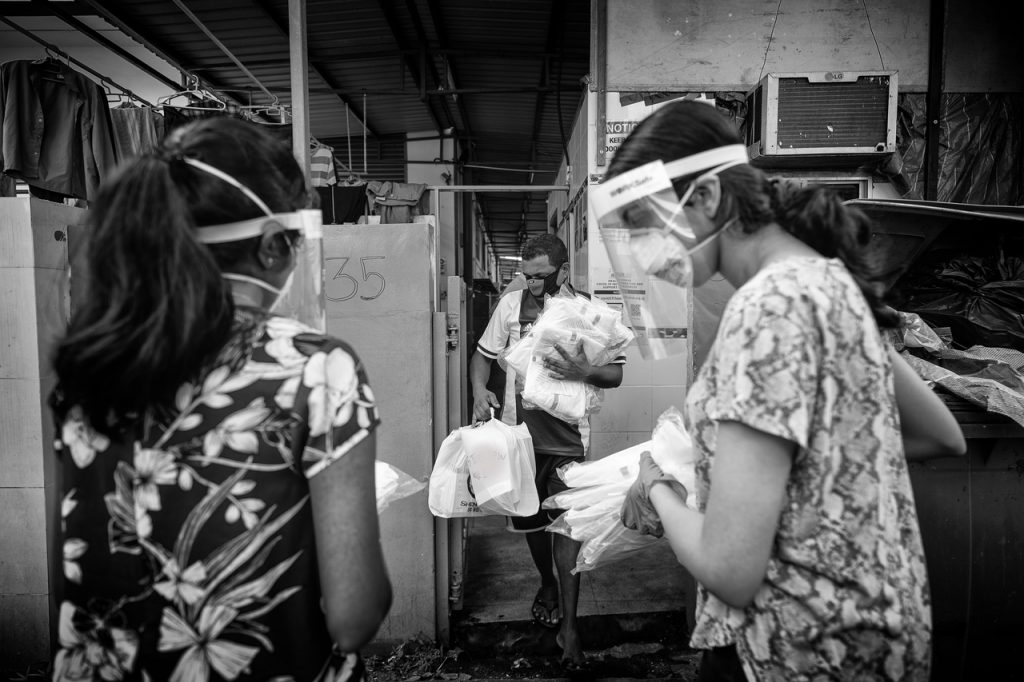
5. Lost in translation
Throughout this time, and even before the outbreak, the language barrier has been a big problem.
Initially, most of the advisories we received from MOM in February were in English. Later, in March, they became available in more languages. Still, there were gaps. With so much new information coming in, how would we explain this to the men when most times, they don’t even fully understand what we’re talking about?
Let me give you an example.
After the outbreak reached our dorm, the authorities came to issue quarantine orders to the residents. By this time, Ramadan had started, and they came in the evening when the men were breaking fast. I thought they could have been more sensitive and come in the daytime, instead of coming when they were having dinner after not having eaten all day.
They came with a team of CISCO officers to distribute thermometers and face masks, and give each of the men a quarantine form to sign. The men would get their form, and then proceed to another counter, where an officer would explain the form to them and ask them to sign it. Then they would go to another area where a young lady showed them how to use the thermometers.
The officers obviously tried their best to explain what everything meant. But because of time constraints, they probably only got about two minutes with each worker. With hundreds of men to go through, they didn’t finish until midnight. And all the explanations were done in English.
I know my men. They don’t ask questions, maybe because their English isn’t good, or they don’t dare, or they are too shy. So the next day, I went to their rooms to ask if they understood what happened the night before. Everyone nodded.
Then I asked, “Do you know what you all signed?” They said, “No.”
I said, “This is a quarantine order, there are about 14 or 15 rules that you all have agreed to obey. You all cannot do this and cannot do that. You all understand or not?” And they were stunned. They said, “Huh?”
Do you see the problem? Even if they know that this is a quarantine order, they don’t know what they can or cannot do, because they don’t understand the language. David and I have noticed that often, when we talk to them, we have to demonstrate instead of telling them. We have to show them through actions rather than telling them “This is what you do”. Because they really don’t understand.
I feel sorry for men who have been sent home and had their Work Permits cancelled for violating the circuit breaker rules. Luckily, this hasn’t happened to any of the men in my dorm. But in some cases, even if they had repeated warnings, maybe things weren’t explained to them clearly to them in a language they can understand. In which case, it might not be fair to them.
Under normal circumstances, the men can probably manage with simple instructions at the worksite: take this, do that. But with these more complicated issues, I don’t think they really understand what’s happening.
Maybe that’s one reason why the virus has spread among them so fast. They wouldn’t understand the seriousness of it if nobody explained it to them in their own language.
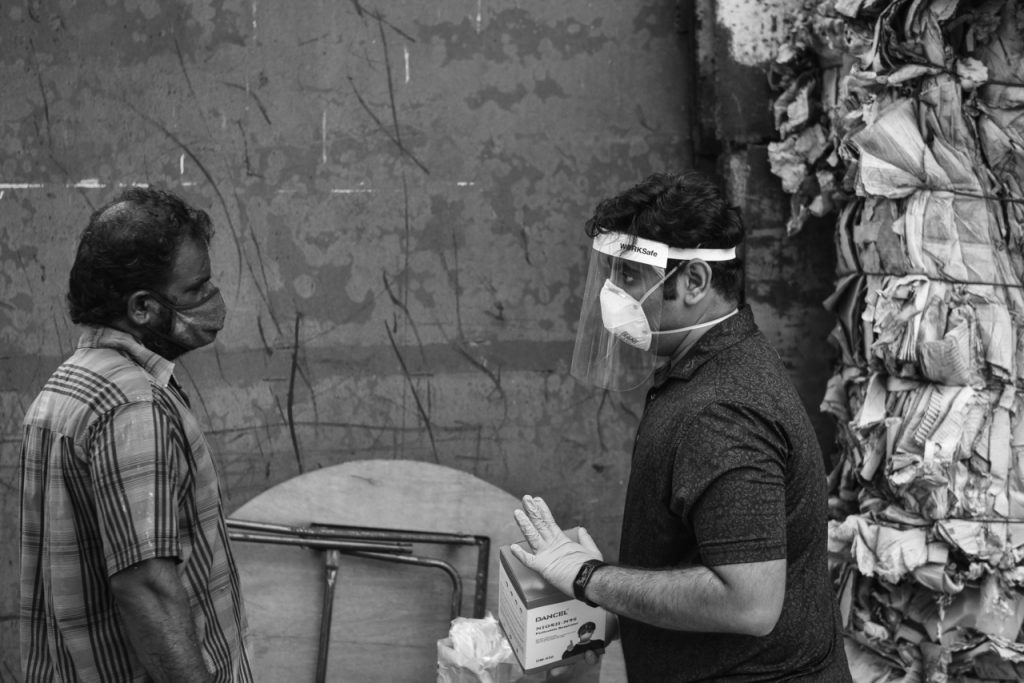
6. Communication gaps
Another problem is keeping up with the various operational requirements as the Covid-19 situation develops.
At first, when we didn’t have cases in the dorm, this was fine. Distancing, hygiene—okay. We can follow. But after the outbreak hit, we kept getting new policies with new requirements for us to follow. Different officers also kept turning up to repeatedly ask about our measures. By the end, I’d almost given up because they’re almost impossible to carry out.
For example, I’ve just been told that we need to have a security officer on duty 24/7. It’s fine if they want to introduce this, but I don’t think they understand we’re already having problems with security companies threatening to quit. How would I find an officer willing to come work in my dorm?
Initially, when the quarantine orders were issued and some of my men were taken away, the authorities didn’t communicate this to us first. The CISCO officers showed up at the dorm with a list of the men who needed to be taken out, but no one had called us first to tell us to expect them.
To be fair, I’ve gotten to know one MOM officer who’s been communicating with us a lot. He’s been very helpful. For example, when I told him we were having trouble sourcing things like portable toilets due to high demand, he helped put me in touch with a supplier.
The situation has eased a bit, now that some residents have been removed, and Speaker Tan Chuan-Jin also came to visit us with Yinzhou and some volunteers from Healthserve on April 25th.
Since the cases developed, MOM has been coming in daily to inspect the premises and check on us, although I hope they can give out more practical help and suggestions. They have been giving us lots of instructions to follow, but it’s hard with the practicalities of the quarantine they’ve imposed. To be honest, if they locked down the dormitory and took over, it would help us a lot.
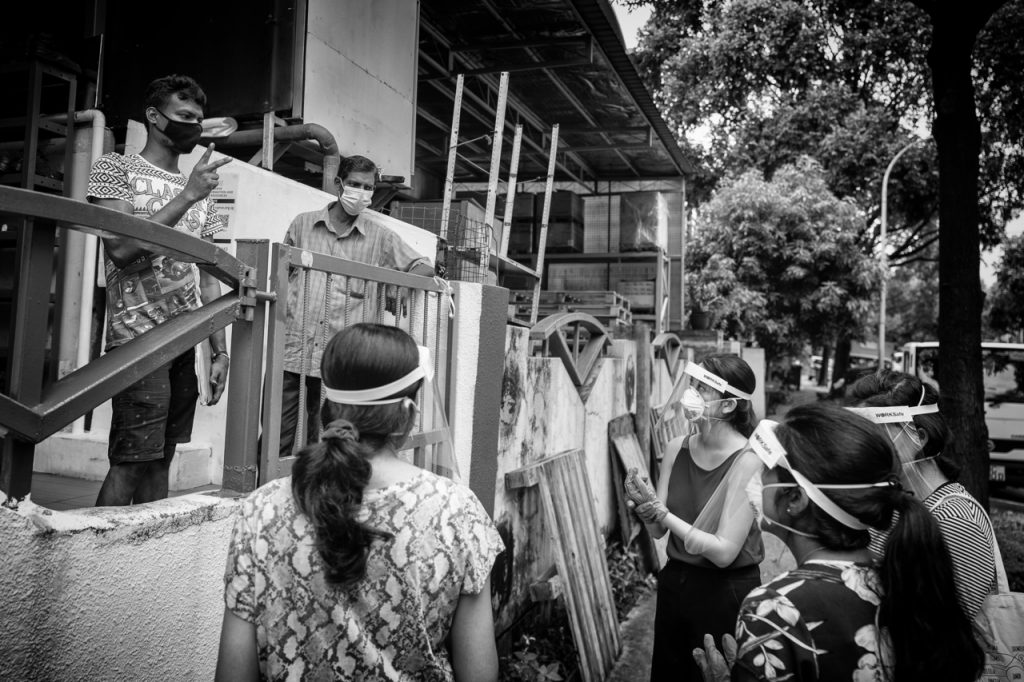
7. Money matters
With the outbreak, there have been so many reports in the news, but I think the public has to understand there are different kinds of dormitories.
There are the big purpose-built dormitories (PBDs), which are run by commercial operators. And then there are FCDs like mine, where all the men inside usually work for the same employer. For us, the intention is not to make a profit but to cater for our own workers, and since they are our own, their interests are also our priority. Without them, our projects can’t move on.
You also need to understand the costs of employing a migrant worker. There are three parts to consider: their salary, accommodation, and the foreign worker levy.
It varies, but the levy is maybe $700. For an Indian or Bangladeshi worker on a Work Permit, with low or no skills, their gross pay is around $500 to $1,000 (including overtime). On top of this, some employers cover accommodation. In a PBD, I think this could range from $220 to $350 per month.
What I’m trying to say here is that all these work hand in hand. Say an employer only has X dollars to spend per worker. This has to cover all three costs. In my opinion, if the levy was lower, it would allow us to afford better accommodation, improve their food, or pay them more.
Personally, I feel their pay is already quite low compared to the cost of living here in Singapore. Right now, based on a sum of $1,000, they earn only $40 a day, which is only $4/hour for 10 hours of work. This includes overtime, so their basic pay is lower, and they also have to cover their food. I do hope the government will look into all this. In my opinion, if they review this, maybe they could come up with minimum wages.
Right now, the men also pay about $130 a month for their food—three meals a day, seven days a week. This means that each meal only costs around $1.40, so you can imagine what they are eating. Somehow they seem to be quite happy, but when I see them eat, it’s usually a lot of rice to fill up their stomachs.
Breakfast is usually two pieces of naan, or roti prata with gravy. That’s all. Lunch is rice and curry with meat, but usually just one piece. At most, they have two pieces for dinner. Maybe it’s gotten to a point where they just accept that this is what they eat. Maybe curry is all they want. But when I see what they have, it’s really so basic.
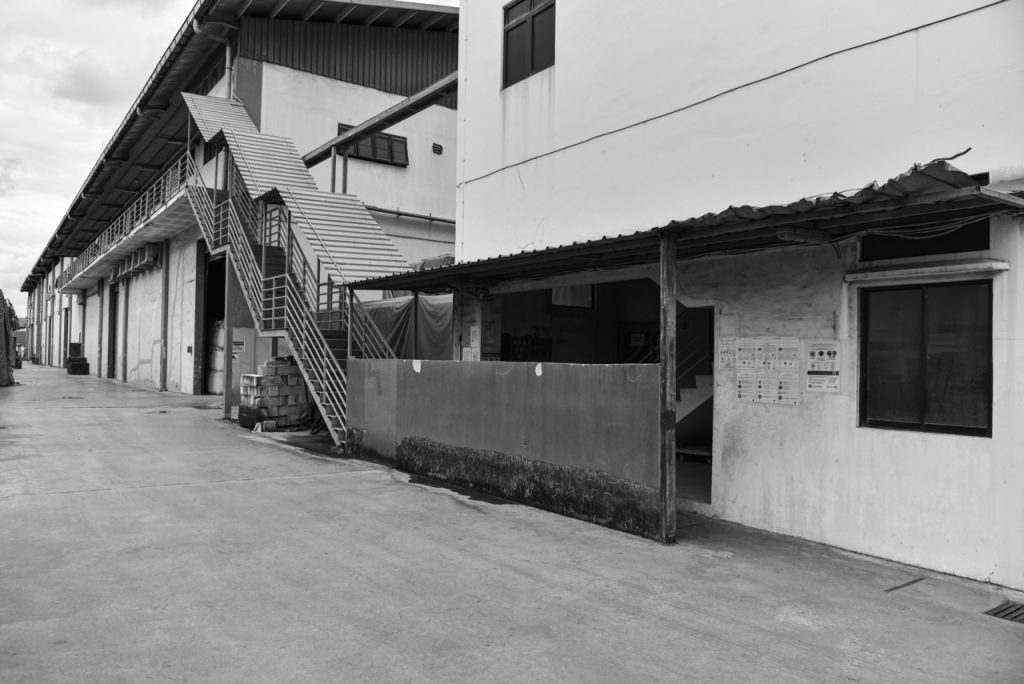
8. Moving forward
The outbreak was completely unexpected. These circumstances are something none of us have come across before, so there was bound to be panicking or not doing well or not knowing what to do. Personally, I have moved from frustration to anger to acceptance. In my case, without help, I would have given up.
Again, I think the public has to differentiate between the different kinds of dormitories and operators. As a FCD, ours is small compared to the PBDs. I think it’s not fair to jump to conclusions and say all operators only care about money or they’re not looking after their workers well. After all, when nothing was happening, no one ever complained about what was going on.
But going forward, now that this crisis has happened, I personally feel the space and facilities for residents are no longer sufficient, even though our current numbers were approved by the authorities. I was thinking to myself the other day: say I live in a three-room flat with four people, so it’s just five of us, and already sometimes we have to wait for the toilet. Let alone if you have 400 to 500 people, sharing only 40 toilet cubicles … for future dormitories which are built, all this has to change. We cannot let this happen again.
After running this dormitory and getting to know a bit more about the situation, I think that we say that [migrant workers] help build our nation, but we haven’t really given them proper treatment or proper facilities. In the future, their welfare has to be very important. As an operator and employer’s representative, I personally feel a bit ashamed for not doing more for them.
Endnotes
[1] This account represents Mr Tan’s experience of events as they were occurring in April, and may not reflect the current situation on the ground. The interview was conducted at the end of April.
[2] We reached out to MOM and MOH for comment, but did not receive a response in time for publication. We will update the piece accordingly if a response is received.
This is the first story in WORK IN PROGRESS, a content series we are running in partnership with the Covid-19 Migrant Support Coalition (CMSC). You can support their work by making a donation here, or by granting a wish through their Majulah Belanja initiative. Dorm operators/employers can make requests for morale boosters to encourage their workers through Covid-19, while donors can match these requests or extend offers of help.
Send us your thoughts on this story at community@ricemedia.co.
